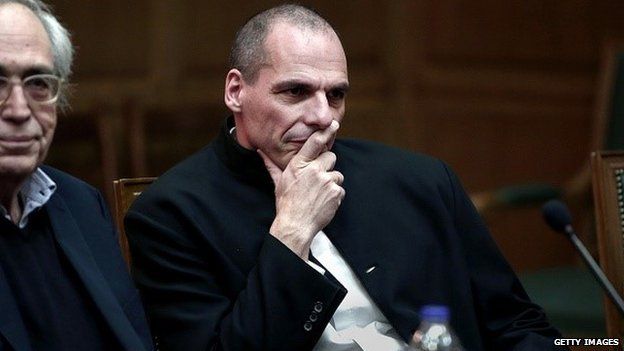Yanis Varoufakis calls for end to 'toxic blame game'
- Published

Greek finance minister Yanis Varoufakis has called for an end to the "toxic blame game" between Greece and Germany.
He made the call as Greece prepares to finalise its list of economic reforms to present to its international creditors.
The reforms are needed to unlock a new tranche of bailout cash for Greece, which could run out of money in weeks.
Mr Varoufakis said that finger-pointing between Germany and Greece would only aid Europe's enemies.
Athens and Berlin have been engaged in a bitter war of words as the Greek government seeks to renegotiate the terms of its bailout.
German finance minister Wolfgang Schaeuble has publicly expressed his anger, claiming last week that Greece "has destroyed all trust". He also acknowledged that Greece could "accidentally leave the eurozone".
Writing in the German business newspaper Handelsblatt, Mr Varoufakis said that tensions between the two countries "must stop", adding: "Only then can Greece, with support of its partners, focus on implementing effective reforms and growth-orientated policy strategies."
Greece submitted preliminary plans to the European Union, International Monetary Fund and the European Central Bank on Friday night that it says will raise some €3bn (£2.2bn) in state revenues.
They include measures to combat tax evasion, more privatisations and higher taxes on alcohol and cigarettes, but no "recessionary measures" such as wage and pension cuts.
However, the reforms as initially proposed do not appear to have been specific enough to win the approval of the lenders, formerly known as the "troika".
'Positive sign'
European Commission spokesman Margaritis Schinas said on Monday that the list of reforms still "requires a lot of technical work" despite talks over the weekend.
However, he added that the continuing discussions were "a positive sign that shows willingness and seriousness of all sides to constructively engage".
Officials say the final list may not be ready for several days.
German Chancellor Angela Merkel said that Greece had some flexibility about the reforms it chose, but that they must "add up".
"The question is can and will Greece fulfil the expectations that we all have," she said on a visit to Helsinki.
"In the end the financial stability of the country must be restored. Greece is talking with the institutions now. We are waiting on these talks. And we will wait for the evaluation of the institutions."
Speaking in parliament later on Monday, the Greek prime minister Alexis Tsipras repeated that his government was ready to strike a deal with creditors - but not at any cost.
But he did acknowledge the need to restructure the country's debts.
"There is the recognition [from lenders] of the need to finally begin a debate on the necessary restructuring of the Greek debt," he told parliament.
"Because without such an intervention it is impossible to repay it."
Greece faces a deadline on 9 April when it is due to repay a tranche of funds to the IMF.
Mr Tsipras added that the country was already seeing the benefits of his strategy, with the introduction of a new law making it easier to repay tax arrears leading to 100 million euros in a week.
- Published29 March 2015
- Published20 February 2015
- Published18 February 2015